If your beloved pet escapes from your vacation destination or runs away from the pet sitter at home, it's a big worry. As no one is immune to such an eventuality, pet owners should have their pet identified with a transponder and microchip and register it with FINDEFIX. The German Animal Welfare Federation advises this.
"A 15-digit number is stored on the microchip," explains Daniela Rohs, who manages the German Animal Welfare Federation's FINDEFIX pet register. "If this number is stored in the pet register along with the owner's current contact details, a lost animal that is picked up somewhere can be matched. That way, animal and human are quickly reunited." This also applies when on vacation: FINDEFIX exchanges information with other registration services worldwide and can be contacted around the clock by the owner and the person who found the animal.
PET OWNERS USUALLY HAVE TO TAKE CARE OF THE REGISTRATION THEMSELVES
The procedure of "chipping" at the vet is largely painless for the animals. A transponder about the size of a grain of rice, which contains the microchip, is inserted under the skin on the left side of the animal's neck using a cannula. Pet owners can expect to pay around 55 euros for this procedure. Subsequent registration with FINDEFIX is free of charge and can be done online at www.findefix.com, among other places. Owners must take care of this themselves, as very few vets automatically transfer the data to a pet register. "If the vet does not point this out, the second step of registration is unfortunately often forgotten by pet owners," says Rohs. Microchip identification only makes sense in combination with identification in the pet register. "If the chip number is not registered, it is difficult or impossible to find out where the animal belongs."
MICROCHIPPING IS COMPULSORY WHEN TRAVELING ABROAD
If the animal is allowed to travel abroad, microchipping is even required by law. Within the EU, dogs, cats and ferrets must be chipped in order to be allowed to cross a border. In addition, the so-called EU pet passport, which is issued by the vet and in which the chip number is also noted, must be carried. A valid rabies vaccination is also mandatory. In other countries, there may be further requirements that must be observed. Parasite protection is also recommended to prevent diseases, especially when traveling to southern and south-eastern countries. You should seek advice on this from your vet in advance.








